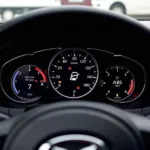An OBD2 scanner is an essential tool for any car owner or mechanic. It allows you to read and clear diagnostic trouble codes (DTCs), monitor engine performance, and troubleshoot car problems. But what happens when your trusted OBD2 scanner suddenly stops working? Even worse, what if it shows signs of burning or “frying”? The term “OBD2 scanner fry” might sound alarming, but it’s a situation many car enthusiasts have unfortunately encountered.
While the phrase itself might not have a standardized definition, it generally refers to an OBD2 scanner experiencing a critical malfunction, often due to electrical issues, rendering it unusable. This article delves into the potential causes of an “OBD2 scanner fry,” preventive measures, and what to do if your scanner suffers such a fate.
Common Causes of an “OBD2 Scanner Fry”
Several factors can contribute to an OBD2 scanner malfunctioning to the point of no return. Understanding these causes can help you avoid a frustrating and potentially costly situation:
- Voltage Overload: One of the most common culprits is a sudden surge in voltage from the vehicle’s electrical system. This can happen due to a faulty alternator, a jump-start gone wrong, or even a loose battery connection.
- Short Circuits: A short circuit in the vehicle’s OBD2 port or within the scanner itself can lead to excessive current flow, damaging the delicate electronics.
- Incompatible Devices: Using an OBD2 scanner that is not compatible with your vehicle’s make, model, or specific OBD2 protocols can cause communication errors and potential damage to both the scanner and the vehicle’s computer.
- Water and Moisture: OBD2 ports are somewhat vulnerable to the elements, especially in older vehicles. Water or moisture entering the port can cause corrosion and short circuits, potentially damaging a connected scanner.
- Physical Damage: Dropping the scanner, subjecting it to extreme temperatures, or even storing it improperly can impact its internal components and lead to malfunctions.
Protecting Your OBD2 Scanner: Prevention Tips
The good news is that most cases of “OBD2 scanner fry” are preventable with some simple precautions:
- Invest in Quality: Opt for a reputable brand of OBD2 scanner known for its quality and safety features. A well-built scanner is less likely to succumb to voltage fluctuations or other electrical issues.
- Check Compatibility: Before plugging in any OBD2 scanner, double-check its compatibility with your vehicle’s year, make, and model. Refer to the scanner’s documentation or use online resources to ensure a proper match.
- Inspect the OBD2 Port: Take a moment to visually inspect your vehicle’s OBD2 port for any signs of damage, debris, or moisture. If necessary, clean the port gently with compressed air or a dry cloth.
- Handle with Care: Treat your OBD2 scanner as a sensitive electronic device. Avoid dropping it, exposing it to extreme temperatures, or storing it in damp or dusty environments.
- Professional Installation: If you are installing an OBD2 scanner that requires hardwiring, consider having it done by a qualified mechanic to ensure proper connections and avoid potential electrical problems.
My OBD2 Scanner Fried! What Now?
If your OBD2 scanner has already fallen victim to a “fry,” the first step is to assess the situation. Check the scanner for any visible signs of damage, such as burnt components or melted plastic. If the damage appears severe, it’s likely time to replace the scanner.
Before purchasing a new one, consider these factors:
- Warranty: Check if your old scanner is still under warranty. Some manufacturers offer protection against defects and malfunctions.
- Replacement Cost: Weigh the cost of repairing or replacing the scanner against the price of a new one. In some cases, replacement might be the more economical option.
- Upgrade Opportunity: If you were already considering upgrading to a more advanced OBD2 scanner with additional features, this could be a good opportunity to do so.
Frequently Asked Questions (FAQs)
Q: Can a fried OBD2 scanner damage my car?
A: While rare, it’s possible for a severely damaged scanner to cause further electrical issues in your vehicle. It’s crucial to disconnect the scanner immediately if you suspect it has fried.
Q: Can I prevent a fried OBD2 scanner by disconnecting it when not in use?
A: Disconnecting the scanner when not in use is generally good practice, but it doesn’t guarantee protection against voltage surges or other electrical problems.
Q: How can I tell if my OBD2 port is damaged?
A: Visual inspection is a good starting point. Look for bent or broken pins, corrosion, or debris. If you suspect damage, have a qualified mechanic inspect the port.
Need More Help?
If you have additional questions or need assistance with your OBD2 scanner, our team of experts is here to help. Contact us via WhatsApp at +1(641)206-8880 or email us at [email protected]. We offer 24/7 customer support to address your automotive diagnostic needs.
